Henry and Ribsy (8 page)
Authors: Beverly Cleary

The warm soup and the rocking of the boat made Henry sleepy. He tossed out his line, reeled it in, and wiped his nose over and over again. Why couldn't a fish hurry up and bite? He wished he could go back to the boathouse and stretch his legs, but he didn't like to say so when his father and Mr. Grumbie were so interested in fishing. Occasionally a shout went up from one of the other boats and someone held up a salmon. Rain clouds washed over the forest-covered mountains along the edge of the sea. To the south Henry could see another shower approaching. He turned up the collar of his raincoat and waited for the first drops to come spattering down.
“What time is it, Dad?” Henry asked.
“Ten o'clock,” answered his father, reeling in his line. “Getting tired?”
“N-no.” Henry tried to keep from shivering. Only ten o'clock in the morning. It seemed as if they had been there forever. Why, it wasn't even lunchtime! If only he could put his head down someplace for just a few minutesâ¦
Suddenly Mr. Grumbie uttered a noise that sounded like “Wup!”
“Got something?” Mr. Huggins's voice was tense as he put down his rod and picked up the gaff.
“Yup.” Grimly Mr. Grumbie wound his reel.
Henry was no longer sleepy. He dropped his rod and watched eagerly as Mr. Grumbie reeled in his line. He wanted to see exactly how a fish was landed. If a salmon bit for Mr. Grumbie, a salmon might bite for him.
Mr. Grumbie stopped winding the reel. The line began to unwind and Henry knew the salmon was pulling on it. “Is it going to get away?” Henry whispered to his father. He knew he must not disturb Mr. Grumbie.
“I don't think so,” answered Mr. Huggins. “If the fish puts up a fight, it's best to let him have the line or he'll break it.”
When Mr. Grumbie began to wind the reel again, Henry watched breathlessly. Suddenly the fish began to fight once more. Mr. Grumbie looked grim as he waited for the salmon to rest. Then he turned the handle of the reel again. The great fish flopped out of the water near the boat. “Get him!” said Mr. Grumbie.
Henry watched his father lean out of the boat with the gaff. “Got him,” he said, as he hooked the fish through the gills and yanked it into the boat. The enormous fish did not stop fighting. Mr. Huggins tried to club it but missed, and the flopping salmon slapped against the sleeping Ribsy.
Ribsy woke up, saw the strange flopping thing, gave one terrified yelp, and tried to scramble away from it. As he fell over the line and fought desperately to get away, the hook was torn from the salmon's mouth. Mr. Grumbie tried to grab his fish, but it slid through his hands, leaving them covered with scales. Again it slapped against Ribsy, who fell over the lunch boxes in his struggle to get away. With one mighty flop the fish cleared the side of the boat, landed with a splash that showered Henry and the two men, and swam away.
“Ki-yi-yi,” yelped the terrified Ribsy, as he fought free of fishing rods and lunch boxes. With one frantic glance backward, he leaped out of the other side of the boat and started swimming upstream.
It all happened so fast that Henry and the two men sat with their mouths open.
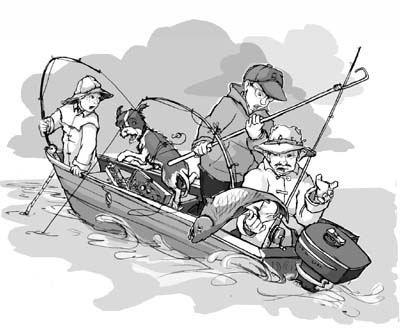
“Well⦔ said Mr. Huggins.
Mr. Grumbie did not say a word. He looked at his hands, covered with fish scales, and stared at the water where his fish had disappeared.
“Dad, start the boat,” yelled Henry. “Get Ribsy. He'll be carried out to sea.”
It seemed to Henry that it took his father forever to pull up the anchor and wind the rope around the starter. “Ribsy!” he called frantically to his dog, who was fighting against the swift current of the river with his nose pointed out of the water. “Dad, hurry!” Henry knew that if Ribsy was carried into the breakers he wouldn't have a chance.
Mr. Huggins jerked the rope. The motor sputtered and died. Hurriedly he rewound the rope.
“Dad!” cried Henry in despair. “Ribsy!” The dog was swimming with all his strength but was slowly being carried backward. A gust of wind blew across the choppy water and a wave washed over Ribsy's head.
Still the boat would not start.
“Dad, he can't swim against that current,” cried Henry, looking back at the hungry breakers. “Can't you hurry?”
Mr. Huggins rewound the rope and yanked. The motor gave a tired gasp.
Now Ribsy was being carried back past the boat. I've got to get him, thought Henry, and leaned out of the boat. Ribsy was so close he could see the wild look in his eyes and watch his paws working under the water. Henry leaned a little farther out of the boat, reached toward Ribsy, and lost his balance. As he started to topple into the water he felt a hand grab him by the collar of his raincoat and yank him back into the boat.
“Don't lean out,” said Mr. Huggins sharply, and rewound the rope. Henry knew there was no reason now to lean out of the boat. The current had swept Ribsy far beyond his reach.
By this time the fishermen in the other boats were watching. “Don't worry, sonny,” called one of the men. He pulled up his anchor, started his powerful motor, and headed toward Ribsy. More terrified than ever by the roar of the motor, Ribsy struggled to get away from the boat bearing down on him.
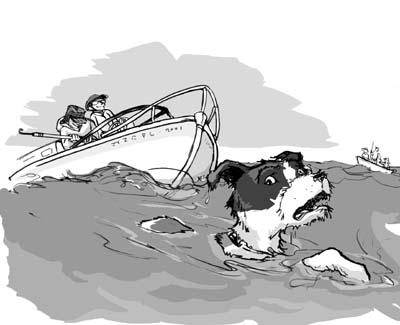
Henry was almost afraid to look. What if the man couldn't catch Ribsy? Or what if the boat ran over him? The man steered his boat close to Ribsy, reached out with his gaff, hooked it through Ribsy's collar, and lifted the struggling, dripping dog into his boat.
The other fishermen began to laugh. “Must be a thirty-pounder you just landed,” someone called.
Henry was limp with relief. Let them laugh. Ribsy was safe. He wasn't going to be carried out into those angry breakers. That was all that mattered.
The man swung his boat around in a wide circle and pulled up close to the Hugginses' boat. He handed the soggy dog across to Henry.
“Gee, thanks,” Henry managed to say, as he clutched the shivering Ribsy.
“Don't mention it,” answered the man. His big boat roared away, leaving the smaller boat bobbing in its wake.
“Gee⦔ Henry hugged his dog. Ribsy licked his face with his long pink tongue. “Gee, that sure was close.”
“It sure was,” agreed Mr. Huggins. An uncomfortable silence fell on all three. “Sorry about the salmon, Grumbie,” added Mr. Huggins.
“Must have been a twenty-five-pounder,” said Mr. Grumbie regretfully.
Henry didn't want to look at Mr. Grumbie. “I'm sorry, too,” he said, as he ran his hand along Ribsy's tail to wipe off some of the water. “I guess Ribsy had never seen a salmon before and it scared him. I know he didn't mean to make you lose it.”
“Henry, how would you like to take Ribsy to the boathouse to dry out?” asked his father.
“Good idea,” said Mr. Grumbie.
“OK, Dad,” agreed Henry, because he wanted to get his dog warm and dry again. But from the way Mr. Grumbie spoke he knew he would have to stay there the rest of the day. And his chance to catch a salmon was gone. Henry looked sadly at his dog.
Ribsy stood up and shook himself until his license tags jingled.
W
ell, I guess it wasn't your fault.” Henry looked glumly at Ribsy, huddled in front of the electric heater in Mike's boathouse. It did seem as though his dog got him into a lot of trouble. Now, after all his bragging, he wouldn't get to take a salmon home to show people. As for Mr. GrumbieâHenry did not like to think about the long ride home in the same car with him. He knew Mr. Grumbie would be thinking about his lost salmon and blaming it on Ribsy.
Henry looked out of the window at the scales hanging from the eaves and sighed. Because of Ribsy he had lost his chance to hang a fish on that hook and watch the hand spin around to twenty-five.
“What time is it?” Henry asked the boathouse man.
“Five after two,” answered Mike.
Five minutes past two. It would be at least three hours before his father would be through fishing, and Henry had eaten all his lunch hours agoâwith Ribsy's help, of course. He wished he had some money so he could go across to the restaurant and buy a hamburger.
Henry amused himself looking at the pictures of fishermen with their catches that covered the walls of the boathouse. He examined a case full of tackle for sale. Then he looked through a telescope that stood by a window. He focused it on his father and Mr. Grumbie, but he couldn't see any salmon in their boat. If Mr. Grumbie should catch a whopper, the ride home would not be so bad.
Henry turned the telescope on the other boats. If some of the other fishermen were pulling in salmon, maybe Mr. Grumbie would land one, too. When Henry came to the last boat in line he looked, twisted the adjuster, and looked again. Was that Scooter McCarthy and his father? It looked like them, but the brims of their hats were turned down so far Henry could not be sure. Lots of men wore black raincoats and almost every boy had a yellow slicker, so it might be somebody else. Henry hoped so. If he had to watch Scooter come in lugging a salmon, even a silverside, he didn't know what he would do.
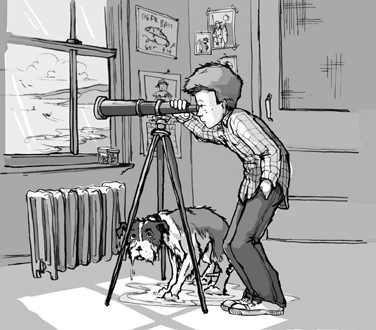
“Smells kind of doggy in here, doesn't it?” remarked Mike.
“My dog is almost dry,” answered Henry, as he rubbed his foot through a puddle of water that had dripped off Ribsy.
A man came in to buy some tackle. He sniffed and looked around. “I thought it smelled like wet dog in here,” he said, when he saw Ribsy.
Henry began to feel uncomfortable, almost unwelcome.
Two women came in to look at their husbands through the telescope. They glanced at Ribsy and frowned. “I don't think there's anything that smells quite so bad as a wet dog,” said one of the women, as she adjusted the telescope.
“Come on, Ribsy, let's go outdoors.” Henry didn't think Ribsy smelled so badâjust a little extra doggy, was all. But if they weren't wanted, well, they'd wait someplace else. Henry sighed and wondered what they would do the rest of the long afternoon. It wouldn't be so bad if only he was not so hungry.
Outside, Henry looked over the row of parked cars. Third from the end he found a green two-door Ford, deluxe model, with nylon seat covers, a Yellowstone National Park sticker on the windshield, and a Mount Rainier National Park sticker on the rear window. There could be no doubt about it. That car surely belonged to Scooter's father.
“Let's go down to the beach,” Henry said to his dog. “Then maybe we won't have to see old Scooter when he comes in with all those fish he'll probably catch. You'd think with the whole Pacific Ocean full of fish he could have gone someplace else.”
The rain had stopped and the wind blew ragged clouds across the blue sky. Henry and his dog followed a sandy road that wound through piles of driftwoodâlogs and stumps, boards and boxes, all bleached gray by the seaâuntil they came to the hard wet sand along the breakers. Henry looked at the people fishing from the sandbars and then wandered along the beach. He threw sticks into the breakers to see them carried up on the sand and then get sucked back into the ocean by the undertow. He picked up a few shells and examined a jellyfish lying on the sand. And all the time he was thinking about the salmon he wouldn't catch and wondering how he could face Mr. Grumbie on the way home.
“Come on, Ribsy, race you!” Henry called above the roar of the surf. Ribsy stopped trying to chase seagulls. Leaving a border of paw prints along the edge of the waves, he ran up the beach ahead of Henry.
Henry began to enjoy himself. He made a game of seeing how close to the water he could run without letting the waves touch his shoes. Gradually the sun sank toward the ocean, and Henry knew it would not be long before his father and Mr. Grumbie would be through fishing for the day. He decided it was time to start back to the boathouse. “Here, Ribsy,” he called.
Ribsy paid no attention. He was barking furiously at something Henry could not see.
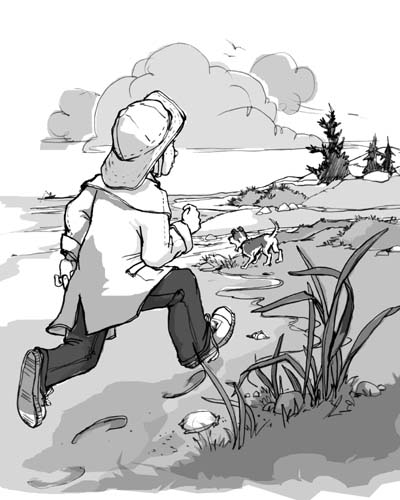
What's the matter with him, Henry wondered. He's sure excited about something. Must be another jellyfish. Maybe I better go look at it.
Ribsy was standing at the edge of a small stream. When Henry got there, he looked into the stream to see what was making the dog bark. Then he stopped in his tracks and stared. It wasn't true. It couldn't be. But there it was! In the shallow water at Henry's feet an enormous chinook salmon was trying to fight its way upstream.
“Wow!” exclaimed Henry, as he watched the salmon struggle to swim in water that barely covered its silver body. The fish was so close he could see the pattern of its scales and the needle-sharp teeth in its mouth. I bet he took a wrong turn, thought Henry. I bet he thinks this is the river. Oh, why did I leave my tackle in the boat? Why didn't I bring it with me?
The weary salmon rested and the current of the stream carried it back toward the ocean. Then it started fighting its way upstream again.
I've got to get him, thought Henry. I've just got to, that's all.
But how? He didn't even have a string and a bent pin, and if he did they wouldn't be any good for such a big fish. He looked around the beach for something he could use to catch the salmon.
Once more the chinook was carried back toward the ocean.
Come on, keep fighting, thought Henry. Don't give up. I've got to think of a way to get him before someone comes along and beats me to it.
Without bothering to take off his shoes, Henry stepped into the stream and waded out to the salmon. I wonder what's the best way to do this, he thought, and bent over. Cautiously he put his hands in the water and then with one quick movement tried to scoop the fish up onto the sand. The salmon, which was heavier than he expected, slid easily over his hands and struggled on, thrashing and fighting to get away from Henry.
Henry made up his mind he was not going to lose that fish. He flung his rain hat and coat and jacket onto the sand. I'll tackle him, that's what I'll do, he thought grimly. I've got to look out for those teeth, but maybe I can grab him by the gills.
While Ribsy continued to bark wildly, Henry took a deep breath and flung himself onto the salmon. The icy water splashed in his face and soaked through his clothes as he gritted his teeth and hugged the big, slippery fish. With one powerful lunge it twisted out of Henry's arms and tried to fight its way through water too shallow to swim in.
Dripping with water and covered with fish scales, Henry got to his feet. If I can just get him onto the sand, he thought, maybe I can sit on him. Once more he flung himself onto the fish and once more the salmon fought free and landed in still shallower water.
That's it, thought Henry. I'll keep pushing him upstream.
The next time he threw himself down he managed to get one hand into the salmon's gills, which were rough and gave him something to hang onto. Henry dug in with his knees and hung on. I think I've got him, he thought. This time the salmon didn't get away.
I
have
got him, but now what'll I do? thought Henry desperately. If I stand up and try to pick him up, he'll get away.
The weary salmon struggled. Grimly Henry held on. His hands were numb and the stream flowing around him felt freezing cold. What'll I do? he thought. I can't hang on much longer.
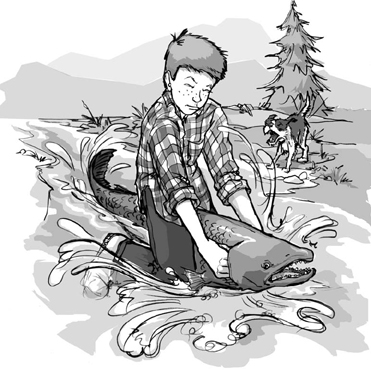
Ribsy was running in circles, barking so hard he sounded hoarse. Henry could feel his grip on the fish's gills begin to slip. He's getting away, he thought miserably. I'll never be able to land him.
“Hang on!” someone yelled. Out of the corner of his eye Henry could see a man standing on the edge of the stream. Then the man disappeared.
Why did he go away, Henry wondered. Why didn't he help me? But in a moment the man reappeared with a piece of driftwood in his hand. He waded into the stream and quickly clubbed the salmon. The fish gave one mighty flop and was still. Dripping and shivering, Henry struggled to his feet with his salmon in his arms. It was his! He had caught a chinook!
“Well, you've caught yourself a mighty fine fish,” said the man. “Must weigh twenty-five pounds at least.”
Henry's teeth were chattering so he could hardly speak. “Gee, th-th-thanks,” he said, as he waded out of the stream. Ribsy approached the salmon cautiously. He sniffed at it. Then he backed away and barked.
“That's all right,” answered the man. “I heard your dog barking and saw your raincoat on the sand. I thought something was wrong, so I came over to see what had happened.” The man hung Henry's jacket and raincoat over his shoulders. “You better get dried out or you'll catch cold. Here, let me carry your salmon.”
Henry didn't want to let go of his fish, but it was heavy and slippery and he was shivering so he could scarcely hang onto it.
“Yes, sir,” said the man as he took the fish. “Twenty-five pounds at least.”
Henry managed to grin, even though his lips were stiff with cold. “I'm sure glad my dog barked. I couldn't have managed if you hadn't come along to help me.”
Boy, oh, boy, thought Henry, as he plodded across the sand in his wet clothes. Wait till the kids at home see my fish! Wait till Scooter McCarthy sees it!
As they neared the boathouse, Henry could hear the sound of motors and knew the fishermen were coming in from the river. “I think I can carry the fish now,” he said, wanting to be sure everyone knew the fish was his. The man smiled as if he understood what Henry was thinking and handed him the salmon. With water dripping off his clothes and squishing out of his shoes, Henry lugged his fish toward the scales.
Several men who were waiting to weigh their catches turned to look at Henry. Mr. Huggins and Mr. Grumbie were just climbing the steps from the river. They looked tired, their faces were red from the wind and cold, and they both needed a shave. To Henry's relief, Mr. Grumbie was carrying a salmon.
“Dad, look!” called Henry, trying to keep his fish from sliding out of his arms.
Mr. Huggins stared. Then he whistled.
“Well, look at that!” said Mr. Grumbie.
“Caught it with his bare hands,” explained the man who had helped Henry. “Yes, sir, the boy waded right into that stream and tackled the fish with his bare hands. Never saw anything like it.”
“And I didn't get a bite all day,” said Mr. Huggins.
